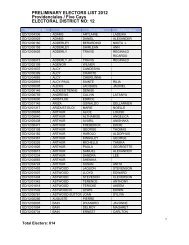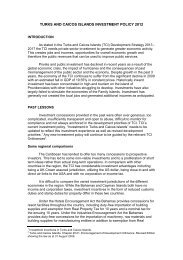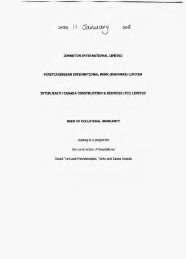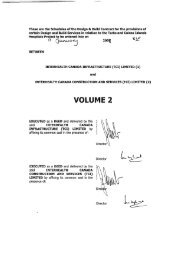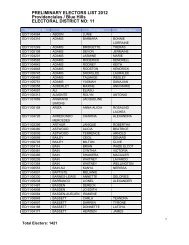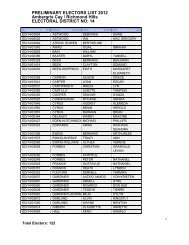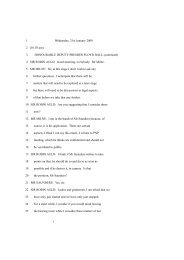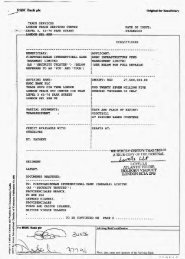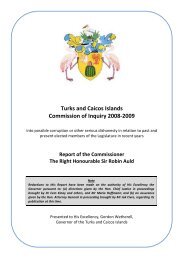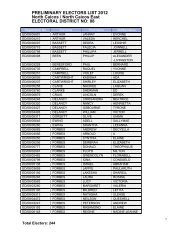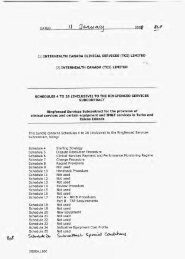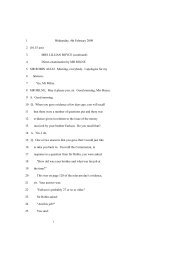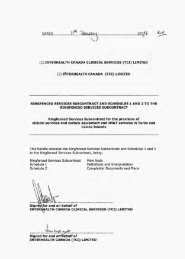position paper - TCI News Now
position paper - TCI News Now
position paper - TCI News Now
Create successful ePaper yourself
Turn your PDF publications into a flip-book with our unique Google optimized e-Paper software.
The Official Op<strong>position</strong>The Turks and Caicos Islands GovernmentVALUE ADDED TAX (VAT)PREAMBLETHE OFFICIAL OPPOSITION “PDM” POSITIONThe Interim Administration of 2009 – 2012 commissioned a revenue study that was conductedby Professor Alan Roe to “assess the various options available to the Government for a revenuestrategy to meet the needs of the medium term.”In the January 2010, Professor Roe’s Report – <strong>TCI</strong>: Current and Potential Revenue Sources: AnAssessment, Professor Roe indicated that the serious economic crisis faced by the <strong>TCI</strong> economywas due to the global recession, hurricane damage and “self-inflicted wounds from maladministration.”He also indicated of our existing system “notwithstanding its somewhatunconventional nature, this structure had proved able to deliver relatively strong revenuegrowth.”VAT was presented as one of the options for the medium term. It was presented as a tax whichwould be assessed on a broader base but at a lower rate, and one which would bring sustainablerevenues to the Turks and Caicos.The process from the preparation of the Green Paper to the passage of the VAT legislation wasrushed and met with resistance from every angle of our society. The model which was used todetermine the efficiency and effectiveness of VAT as a sustainable and affordable form ofrevenue generation was not discussed or shared with the PDM so we are therefore unable toplace any reliance on the Interim Administration’s findings in that regard. We believe that therewas no real consultation and there was no opportunity for real buy in.In April 2012 the Interim Administration announced its intention to introduce Value Added Tax(VAT), a new system of taxation with its main goals being to “help restore fiscal balance and asustainable economy, alleviate poverty and contribute to other critical social development”.Amongst much controversy, and without public support, or adequate consultation, VAT wassigned into law on Thursday July 19, 2012.OUR POSITIONThe Peoples’ Democratic Movement takes the <strong>position</strong> that the consultation process was faultyand conclusions reached by the Interim Administration could not be adequately supported by
The Official Op<strong>position</strong>The Turks and Caicos Islands Governmentfeedback received from industry professionals with decades of doing business and working in the<strong>TCI</strong>. We cannot support the implementation of VAT for the following reasons:1. Increase in the Cost of Living in the Turks and Caicos Islands- With theimplementation of VAT comes the increase in the price of all goods and services in theTurks and Caicos Islands.2. Increase In Cost of Essential Services-VAT will increase the cost of education,medical services and domestic financial services in the <strong>TCI</strong>. These services arecategorised as “exempt”, therefore providers are unable to charge VAT to its customers,however they will have to pay VAT on taxable purchases. This additional cost will thenbe passed on to the customer increasing the cost of the service. VAT will indirectlyincrease the cost of three of the most vital services in our Country -Medical, Educationaland Financial Services3. VAT Violates the Equity Principle of Taxation. VAT is a regressive tax thatdisproportionately disadvantages the poor, since it is a consumer tax and the poor ismore likely to spend more of its income.4. Negative Impact on Businesses Not Meeting the VAT Threshold- There will be asignificant number of businesses with turnover of less than $200,000. These businesseswill not be required to register for VAT. They will be required to pay Input VAT onGoods and Services and expected to pass this on as higher prices. VAT registeredbusinesses may refrain from doing business with these smaller businesses since the VATembedded in the higher prices cannot be recovered. This could eventually result in theclosure of many small local businesses in the <strong>TCI</strong>.5. Economic cost to Small Businesses- Small businesses that do not meet the VATthreshold will eventually register for VAT in order to retain major clients and/or remaincompetitive. As a result, these businesses will now have to update their Accounting andor computer systems or engage the services of an Accountant to track VAT . This wouldresult in increased operating cost and possible bankruptcy, again leading to closure ofsmall businesses6. Opportunity Cost to Small Businesses- Small business that are in the proposed VATthreshold range may have fixed or consistent operational expenses, such as payroll, rent,utilities, etc., that may result in a very small net profit or loss annually. Since VAT isexpected to be paid based on invoices raised and not on collection, this could place anunnecessary burden on the cash flows of these businesses, which could eventually lead totheir closure.7. Property Tax Concerns – According to the VAT White Paper, 11% VAT will beapplied to all land transactions where no stamp duty is applied.
The Official Op<strong>position</strong>The Turks and Caicos Islands GovernmentGeneration property which currently does not attract stamp duty once it is transferredfrom parent to child or vice versa may now be subject to VAT. If a child or parent isunable to pay VAT on this category of transfer, the family member can be faced withextra fees or losses due to their inability to pay.Land Transactions which are now not subject to stamp duty will be subject to VAT of11% a rate higher than the current highest stamp duty rate and which would apply toheritage property, or lower value property.8. Outside the Scope of the Interim Administration- Such a dramatic change in our taxsystem should be the responsibility of an elected Government with a mandate. Webelieve that as our colleague Josephine Connolly coined “It is not so much a matter ofVAT, but one of Democracy.”CONCLUSIONGovernments are put in place to develop laws and policies that protect society andgenerations to come. While we can appreciate the need for Government to ensure a steadystream of revenue to foster greater fiscal health and a sustainable economy for theCountry, there must be a less penalizing means to accomplish this goal.We have grown this economy and managed well under the existing tax regime and are notconvinced that our economy has outgrown this method. We certainly believe that anincrease in resources in compliance will yield much. In fact the Roe Report said that theexisting system produced “strong revenue”.We understand the plight of the people and are careful to increase any further burden onan already heavily taxed shrinking tax base.Our residents and citizens are still trying to recover from effects of the recession. Toimplement a tax system that is particularly burdensome to the middle class and the poorwill not alleviate poverty but create poverty. Governments have to reach a delicate balancebetween having a stable economy and imposing taxes that could result in contracting theeconomy. We are above all really concerned about the uncertainty of the im<strong>position</strong> of theTAX. We cannot afford to make a mistake at this time as it relates to our economy.



